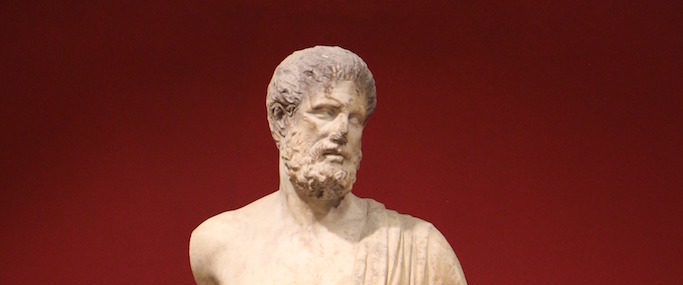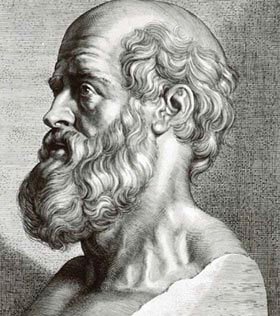
The Hippocratic Oath is probably Hippocrates’ greatest contribution to Medicine. This text was written some 2.500 years ago by Hippocrates or by some of his followers and has been sworn to for centuries by members of the medical profession. Throughout the ages it has often been altered or adapted but has always remained the basis of all texts pertaining to ethical medicine. One of the most famous texts that was inspired by the Hippocratic Oath is the Declaration of Geneva (first drafted in 1948, and repeatedly amended thereafter) by the World Medical Association. Although today many different versions of the Hippocratic Oath are sworn to by medical students, some universities still use the original.
The Hippocratic Oath establishes that physicians must maintain life, hold their elders in the highest regard, know their limitations, and renounce self interest during the treatment of patients. The Oath introduces for the first time medical deontology and confidentiality in the practice of medicine. The views about abortion and surgical practices might seem somewhat outdated in today’s world and in many people’s minds the relevance of the text is often challenged. Although there are limitations and much is debatable, the Oath’s precepts remain eternally modern and its core value will always be pertinent: the selfless dedication to the preservation of human life. The moral message of the Oath has thus remained resilient throughout the ages and the cultures.
Structure of the Hippocratic Oath
The Hippocratic Oath reflects utmost respect towards mankind and altruistic devotion to science. It was most probably written in the last quarter of the 5th century (425-400 BC), when the Medical School of Kos opened up to students outside the closed family circle of physician-priests, the Asclepiads. The Oath thus provided some very important ethical and scientific guidelines to these students. The two first articles of the oath (contract-adoption) were most probably taken at the beginning of the studies while the others, concerning medical professional obligations, were taken at the end.
The Hippocratic Oath is comprised of 9 articles and can be divided into four parts: 1) Invocation, 2) Obligations towards the medical profession 3) Obligations towards the patients 4) Epilogue
1) Invocation (article 1)
In the first article, the oath-taker invokes the gods as witnesses that he will honour the oath. The deities invoked are Apollo, the god of sun, healing, harmony and clairvoyance, who was worshiped in Kos, notably in Alasarna; Asclepius, the deified healer and protector of physicians considered to be the son of Apollo, whose sanctuary, the Asklepieion, adourns Kos; Hygeia, goddess of good health; and Panacea, goddess of therapy.
2) Obligations towards the medical profession (article 2)
The oath-taker promises to honour his teacher, treat his teacher’s sons like his own and to teach medicine to his sons and his teacher’s sons without salary and to teach students who have a natural inclination towards medicine and are willing to take the oath’s obligations. Here we see the major breakthrough that Hippocrates introduced to medicine by accepting people outside the closed family circle of Asclepiads to study in the Medical School of Kos. This article also highlights the strong respect the Greeks had towards their teachers and preceptors.
3) Obligations towards the patients (articles 3, 4 ,5, 6, 7 and 8)
Article 3 underlines the importance of diet, which includes lifestyle in general, baths, sleep etc. The oath-taker promises also not to administer therapy that will harm the patient.
In article 4, the oath-taker promises not to administer a mortal drug to his patient or abortal drugs to pregnant women. As we can see, Hippocrates was against euthanasia and abortions.
Article 5 constitutes the ethical code of practitioners: the oath-taker promises to maintain both his life and practice pure and clean.
In article 6, the oath-taker promises not to undertake dangerous lithotomy chirurgy (surgical method for removal of calculi, stones formed inside certain organs) and to leave them to specialists. This article specialises the work of chirurgeons.
In article 7, the oath-taker pledges to respect the houses of his patients and stay away from any form of injustice or immorality. He should not exploit his position for unethical acts towards the patient, or members of his family and even servants.
Article 8 establishes the principle of medical confidentiality. The oath-taker promises to keep the secrets of his patients and not to disclose any sensitive information.
4) Epilogue (article 9)
The oath-taker hopes for success and glory in his private and professional life, or be cursed should he not keep his oath.
I have added hereafter the original text written in Ionic Greek around the 5th century B.C. as well as a translation of the text in English:
|
Translation in English:
- I swear by Apollo, the healer, Asclepius, Hygieia, and Panacea, and I take to witness all the gods, all the goddesses, to keep according to my ability and my judgment, the following Oath and agreement:
- To consider dear to me, as my parents, him who taught me this art; to live in common with him and, if necessary, to share my goods with him; To look upon his children as my own brothers, to teach them this art; and that by my teaching, I will impart a knowledge of this art to my own sons, and to my teacher’s sons, and to disciples bound by an indenture and oath according to the medical laws, and no others.
- I will prescribe regimens for the good of my patients according to my ability and my judgment and never do harm to anyone.
- I will give no deadly medicine to any one if asked, nor suggest any such counsel; and similarly I will not give a woman a pessary to cause an abortion.
- But I will preserve the purity of my life and my arts.
- I will not cut for stone, even for patients in whom the disease is manifest; I will leave this operation to be performed by practitioners, specialists in this art.
- In every house where I come I will enter only for the good of my patients, keeping myself far from all intentional ill-doing and all seduction and especially from the pleasures of love with women or men, be they free or slaves.
- All that may come to my knowledge in the exercise of my profession or in daily commerce with men, which ought not to be spread abroad, I will keep secret and will never reveal.
- If I keep this oath faithfully, may I enjoy my life and practice my art, respected by all humanity and in all times; but if I swerve from it or violate it, may the reverse be my life.









